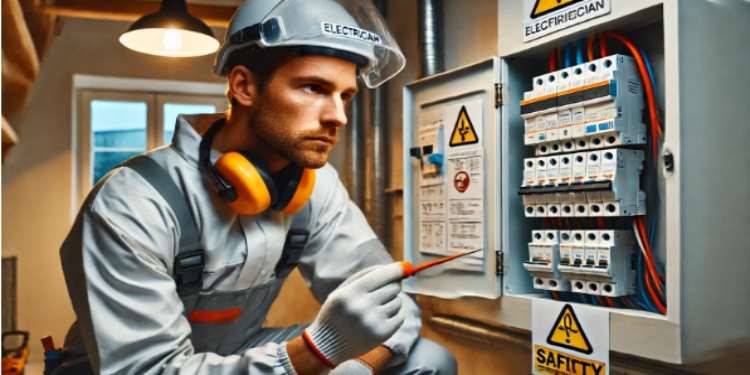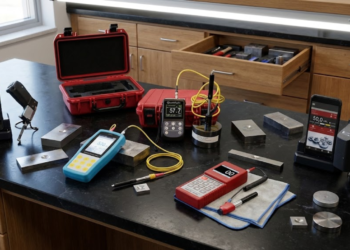Electrical safety is not just about flicking a switch and hoping everything works fine. It’s a crucial part of maintaining a safe environment, whether at home or in the workplace. With the increasing use of electrical devices, the importance of regular safety checks has never been higher. This comprehensive guide will help you understand why an electrical safety check is essential, what it involves, and how Nationwide Surveyors can assist in ensuring your safety.
1. What is an Electrical Safety Check?
An electrical safety check is a thorough inspection of the electrical installations and equipment within a property. This process ensures that all electrical systems are functioning correctly and safely, identifying potential hazards before they can cause harm.
1.1 Why Are Electrical Safety Checks Important?
- Prevention of Electrical Hazards: Regular checks can prevent electrical fires, shocks, and other hazards.
- Compliance with Legal Requirements: Many regions have legal requirements for regular electrical inspections, especially for rental properties.
- Peace of Mind: Knowing that your electrical systems are safe provides peace of mind for you and your family or employees.
2. Key Components of an Electrical Safety Check
During an electrical safety check, several key components are inspected to ensure the overall safety and functionality of the electrical system.
2.1 Wiring and Circuits
The inspector checks the condition of the wiring and circuits to identify any damage, wear and tear, or outdated systems that may pose a risk.
2.2 Electrical Panels
The distribution boards or electrical panels are examined to ensure they are not overloaded and are functioning correctly.
2.3 Switches and Sockets
All switches and sockets are checked for signs of damage, overheating, or loose connections.
2.4 Earthing and Bonding
Proper earthing and bonding are crucial to prevent electric shocks. The inspector ensures all systems are correctly earthed.
3. Who Needs an Electrical Safety Check?
Electrical safety checks are recommended for everyone, but they are especially critical for certain groups.
3.1 Homeowners
Homeowners should have their electrical systems checked every 10 years to ensure everything is up to date and safe.
3.2 Landlords
Landlords are legally required to conduct electrical safety checks every 5 years or at the start of a new tenancy. This is to protect tenants from potential electrical hazards.
3.3 Business Owners
Business owners must ensure that their premises are safe for employees and customers. Regular electrical safety checks are a part of health and safety compliance.
4. Legal Requirements for Electrical Safety Checks
Different regions have specific legal requirements regarding electrical safety. Understanding these can help you stay compliant and avoid potential penalties.
4.1 Residential Properties
For residential properties, especially rental units, landlords must provide an Electrical Installation Condition Report (EICR) every 5 years.
4.2 Commercial Properties
For commercial properties, regular safety checks are part of health and safety regulations. Non-compliance can result in fines and business interruptions.
5. How Often Should You Get an Electrical Safety Check?
The frequency of electrical safety checks depends on several factors, including the type of property and its usage.
5.1 Residential Properties
- Every 10 Years: For privately owned homes.
- Every 5 Years: For rental properties.
5.2 Commercial Properties
- Every 5 Years: For most commercial properties.
- Every 3 Years: For high-risk environments like swimming pools or industrial areas.
5.3 Special Situations
- After Major Renovations: Any significant changes to the property’s electrical system should be followed by a safety check.
- When Buying or Selling a Property: An up-to-date safety check report can facilitate a smoother transaction.
6. Common Electrical Issues Identified During Safety Checks
Understanding the common issues that can be identified during a safety check can help you prepare for potential repairs.
6.1 Overloaded Circuits
Overloaded circuits can cause overheating and, in severe cases, fires. This is commonly found in older properties with outdated wiring.
6.2 Faulty or Damaged Wiring
Wiring can deteriorate over time, leading to exposed wires and potential electric shocks.
6.3 Inadequate Earthing
Improper earthing can result in electric shocks and is a serious safety hazard.
6.4 Defective Electrical Panels
Old or defective electrical panels can lead to power outages and pose a significant risk.
7. Cost of an Electrical Safety Check
The cost of an electrical safety check varies depending on several factors, such as the size of the property and the complexity of its electrical systems.
7.1 Average Costs
- Residential Properties: $100 – $300
- Commercial Properties: $300 – $800
7.2 Factors Affecting the Cost
- Size of the Property: Larger properties require more time and effort to inspect.
- Age of the Installation: Older properties may have more complex issues to address.
- Location: Costs can vary based on geographic location and local market rates.
8. Choosing a Qualified Inspector
Hiring a qualified professional is crucial for a reliable and accurate safety check.
8.1 Why Choose Nationwide Surveyors?
Nationwide Surveyors are known for their expertise and reliability. They provide comprehensive safety checks across various property types, ensuring compliance and safety.
8.2 What to Look for in an Inspector?
- Certifications: Look for certifications such as NICEIC or NAPIT.
- Experience: Choose an inspector with experience in handling similar properties.
- Reviews: Check customer reviews to gauge their reliability and professionalism.
9. Benefits of Using Nationwide Surveyors
Nationwide Surveyors provide a range of benefits that make them a preferred choice for electrical safety checks.
9.1 Comprehensive Inspections
Their inspectors cover all aspects of the electrical system, ensuring no stone is left unturned.
9.2 Timely Reports
You receive a detailed report promptly, outlining all findings and recommended actions.
9.3 Nationwide Coverage
No matter where your property is located, Nationwide Surveyors can provide their services.
10. Preparing for an Electrical Safety Check
10.1 What to Do Before the Inspection
- Ensure Access: Make sure all areas of the property are accessible.
- Clear Clutter: Remove any obstructions that might hinder the inspection.
10.2 What to Expect During the Inspection
- Initial Walkthrough: The inspector will perform a visual check of the property.
- Testing: Various electrical tests will be conducted to ensure everything is functioning correctly.
- Report Generation: A detailed report will be provided, outlining any issues and recommended actions.
11. Understanding Your Electrical Safety Report
The electrical safety report can be complex, but understanding it is crucial to making informed decisions.
11.1 Key Sections of the Report
- Observations: Lists all the findings from the inspection.
- Recommendations: Suggests actions to rectify any issues found.
- Code Ratings: Issues are rated from C1 (immediate danger) to C3 (improvement recommended).
12. How to Address Issues Found in the Report
12.1 Immediate Actions
For issues rated as C1 or C2, immediate action is required. This might involve hiring an electrician to make necessary repairs.
12.2 Long-term Actions
For C3 issues, you should plan to address them in the near future, even though they may not be immediately dangerous.
13. EICR vs. Electrical Safety Check
13.1 What’s the Difference?
An EICR is a type of electrical safety check that focuses on the condition of the electrical installations. It is more comprehensive and is required for compliance in rental properties.
13.2 When to Choose Which?
- EICR: For rental properties or when a detailed report is required.
- Electrical Safety Check: For general safety assurance in residential or commercial properties.
14. Benefits of Regular Electrical Safety Checks
14.1 Preventive Maintenance
Regular checks can identify potential issues before they become major problems, saving you time and money in the long run.
14.2 Increased Property Value
A property with a clean electrical safety record is more attractive to potential buyers.
14.3 Peace of Mind
Knowing your property is electrically safe can provide peace of mind, whether you’re a homeowner, landlord, or business owner.
15. Final Thoughts: Don’t Wait for a Problem to Act
Electrical safety is not something to take lightly. Regular checks are a small investment compared to the potential risks of neglecting your electrical systems. Whether you’re a homeowner, landlord, or business owner, scheduling an electrical safety check can save lives, prevent property damage, and ensure compliance with legal requirements. Nationwide Surveyors are here to help you every step of the way, providing expert inspections and peace of mind.
FAQs
1. How often should I schedule an electrical safety check?
For homeowners, every 10 years is recommended, while landlords should have their properties checked every 5 years or at the start of a new tenancy.
2. Can I conduct an electrical safety check myself?
No, electrical safety checks should be conducted by a qualified professional to ensure accuracy and compliance.
3. What is the difference between an EICR and a general electrical safety check?
An EICR is more comprehensive and is legally required for rental properties, whereas a general safety check is for overall safety assurance.
4. How long does an electrical safety check take?
The duration depends on the property size but typically ranges from 1 to 4 hours.
5. What should I do if my property fails an electrical safety check?
If your property fails the check, you should hire a qualified electrician to address the issues and then have the property re-inspected.




![7 Best POS Software in the UK [2026 Edition]](https://todaynews.co.uk/wp-content/uploads/2026/02/7-Best-POS-Software-in-the-UK-2026-Edition-360x180.png)







































































